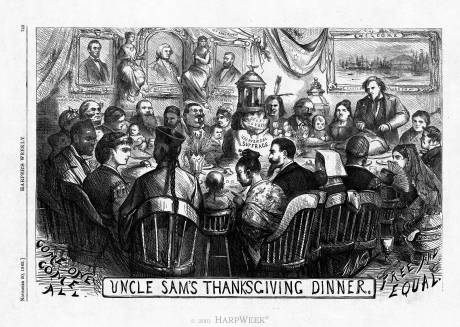 |
Laptop Day (Part 2 of 2): Laptop Empire
These questions ask you to develop some of the concepts and materials that you discovered in Part 1, "Finding Historical Contexts." You can find the worksheet for that here: http://www.wsu.edu/~campbelld/findhistoricalsources.htm .
If you would like to access this page online so that you can click on the links directly, you can find it at http://www.wsu.edu/~campbelld/engl372/laptopempire.htm.
Directions: In a group of 3-4 people, choose one of the following questions. Working together, analyze the texts and gather information on the subject matter so that you can present the information to the class.
|
1. Analyze “The Man Who Would Be King” (http://www.gutenberg.org/ebooks/8147; also in your course pack) as a literary text. Does it resemble any of the other works we’ve read thus far? What features of imperialism does it describe? Would you say that it is an imperialist or anti-imperialist story?
2. An integral part of “The Man Who Would Be King” is the plot device of Freemasonry and the part that it plays in consolidating power among the “white” races. What is the role of race in this story, and what does the Masonic plot add to the tale? What is Freemasonry? Explain some of Peachey’s and Daniel’s allusions.
3. Analyze “The White Man’s Burden” and compare it with “The Black Man’s Burden” and other such responses to Kipling that you may find. How do these responses interpret issues such as imperialism and colonialism?
4. What is Mary Seacole’s perspective on the Americans in the work that we read for class? Who is Mary Seacole? Find information on Mary Seacole that you can share with the rest of the class.
5. What other nineteenth-century British texts deal with imperialism or social conditions more generally? Find examples (for example, the Victorian cartoons from Punch at http://punch.photoshelter.com/gallery/Victorian-Era-Cartoons/G0000czGdMEOaVXY/) and discuss them.
6. The “Orientalist” fantasy of Coleridge’s “Kubla Kahn” was not the only example of the nineteenth-century use of orientalism. Find other examples in poetry, fiction, music, and art for the class to see and discuss (for example, Walter Savage Landor’s “Gebir” http://www.fullbooks.com/Gebir.html, Robert Southey's “Curse of Kehama, “Byron's “Giaour,” and Thomas Moore's “Lalla Rookh.”)
7. Zombies are seemingly everywhere, or at least the idea of zombies seems to be everywhere. Traditionally, however, these creatures were associated with colonized nations and with slavery. (See, for example, http://www.nytimes.com/2012/10/31/opinion/a-zombie-is-a-slave-forever.html). In what ways does the concept of the zombie permeate popular culture as an image of colonialism, imperialism, or slavery? At what points were zombies particularly prevalent in popular culture? You may want to look at films such as White Zombie (1932; supposed to be the first representation of zombies in popular culture; online at http://archive.org/details/White_Zombie_ACM ), I Walked with a Zombie (1943), or other films.
8. Recent film adaptations of classic novels such as Jane Austen’s Mansfield Park have paid increasing attention to colonialism and imperialism. What examples can you find of these themes in current culture?
9. During the late nineteenth century, the United States thought of itself as somehow superior to the imperialism of nations like France and England. Was it? How did the U.S. justify westward expansion? Could that be considered a form of imperialism? We’ve talked about Western narratives before, but in what ways could they be read through this lens of imperialism and colonialism?
10. How did the U. S. rationalize its interventions in Cuba, the Philippines, Mexico, and other countries? Were there literary or popular responses that supported or criticized this perspective? (Think of Twain’s “The War Prayer” or “To the Person Sitting in Darkness” http://people.virginia.edu/~sfr/enam482e/totheperson.html or W. D. Howells’s “Editha” http://public.wsu.edu/~campbelld/howells/editha.htm, or look at the Harper’s Weekly cartoons at http://immigrants.harpweek.com/ )
11. Is there a topic on these readings that you’re dying to talk about but that isn’t mentioned here? Define it and sign up for it.
